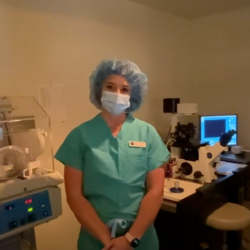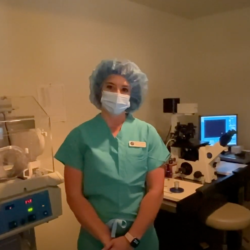
Going into your first IVF appointment can be stressful. Having some questions to guide that conversation can help put your mind at ease. Here are some common IVF questions you can ask during your first consultation.
1. Before I jump into my questions, what would you like me to know?
Often, doctors will already have a structured discussion ready. They’ve likely helped many patients like you, and know which questions you have. By giving them the opportunity to speak first, they’ll cover many of the questions you have in an efficient, easy-to-understand way. They may also have results back from any tests you’ve done, and can speak to specifics for your case.
From there, feel free to ask your doctor any and all of your IVF questions. They’re committed to helping you have the best experience, and that starts with you fully understanding what to expect during the IVF process.
2. What is your clinic’s success rate on a whole, and for patients like me?
You can find national success rates for IVF and other assisted reproductive technologies (ART) at the Society for Assisted Reproductive Technology’s website.
However, your doctor should be able to talk about their success rates—both for successful IVF cycles and live births—for their clinic and for patients with a similar background to yours.
3. What’s your treatment approach and potential timeline for my case?
Know that your actual process and timeline may differ from their projections, but asking your doctor exactly how they’d handle your case, and how long they expect it to take, can set up expectations clearly from the beginning.
4. Who will I be able to contact during the process if I have questions?
Ensure you’re working with a communicative clinic who works hard to ensure you have support when you need it. Ask about their regular hours and if they have anybody on call for immediate concerns.
5. How often will staff communicate with me about updates?
Likewise, whichever clinic you choose will have standard protocols for informing patients of updates.
Some may choose to send updates daily after retrieval, while others only reach out when there’s news. Figure out what you’re comfortable with to ensure the smoothest IVF experience.
6. Do you have weekend or evening appointments available?
If getting out of work for appointments is a concern, see if they have any flexibility when it comes to appointment times.
7. Which types of testing and medications do you recommend?
After going over questions about support and communication, it’s time to ask your doctor specific IVF questions about their approach.
Start by asking about their diagnostic process. How do they approach testing both you and your partner for common fertility issues? Also, talk to your doctor about what types of medication they’ll be using to increase your chances of conceiving. Make sure you understand how you’ll have to take these medications and for how long.
8. Do you do your own testing or have others handle?
Another important question to ask your doctor is how they handle common tests, especially those that examine your FSH, LH, estrogen, or progesterone hormone levels.
The best clinics will handle these in their own clinic, ensuring the highest quality and fastest results.
Some, however, may send them out to be tested by third parties. If working with a clinic that does send them out, ensure that they’re working with a reputable testing facility.
9. How many embryos do you typically retrieve and transfer for patients like me?
Depending on your age and health history, your doctor may recommend a single embryo transfer or multiple.
Multiple embryos may increase some patient’s chances of getting pregnant, but single embryo transfers are undeniably safer for the mother’s and baby’s health. You can learn more about the recommended number of embryo transfers here.
10. Do you prefer fresh or frozen embryo transfers (FET), and why?
A “fresh” or non-frozen embryo is transferred shortly after your eggs are fertilized, while freezing typically takes a few additional weeks, but can increase some patient’s chances of conceiving.
Ask your doctor what they typically use in their clinic and what they recommend for you.
11. Do you recommend performing embryo transfers on the 3rd or 5th day?
Find out during your first IVF appointment if the clinic waits three or five days after fertilization for fresh (non-frozen) embryo transfers.
Again, some patients may have better outcomes from one protocol versus the other.
12. What costs can I expect and which of them, if any, are covered by my insurance?
Make sure to ask about any and all IVF costs you can expect—from the IVF procedures themselves to testing and medications.
If you’re with a major medical insurance provider, also ask them about what it may cover. Many insurance companies don’t cover IVF-related expenses, for example, but your doctor may know that they cover the cost of some medications.
When can we start!?
If you’re ready to get started with IVF, this is probably your most important question! Talk to your doctor about their waiting list and anything else you’ll need to get started.
Other IVF appointment questions may include asking about:
- Your previous health history and risk factors
- Any other medications or supplements you’re taking
- Whether you’ll have to take time off work or avoid travel
If you’re in the Gulf South, we encourage you to reach out to us at The Fertility Institute of New Orleans for more information about IVF. We’ve been making dreams come true since 1976 and have achieved almost 18,000 pregnancies (as of August 2018).
We can answer any IVF questions you have. Contact us today!



